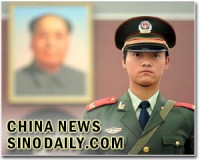 |
New Delhi (AFP) March 10, 2011 The Dalai Lama's announcement Thursday that he plans to step down as Tibet's political leader adds a fresh twist to the upcoming election of his exiled government's prime minister. There are three candidates for the post, which is now expected to assume the powers devolved from the Dalai Lama if his plan to retire is ratified by the 46-member exiled Tibetan parliament which meets next week. The final vote is scheduled for March 20. The first direct election of the prime minister took place in 2001, as part of the Dalai Lama's stated efforts to provide a durable, democratic foundation to the workings of the Tibetan movement. That vote was won by the senior Tibetan Buddhist monk, Samdhong Rinpoche, who was then re-elected in 2006 and is now finishing his second full term. Even before the Dalai Lama's announcement on Thursday, the coming election was already seen as breaking new ground as the contenders all have secular rather than religious backgrounds. A preliminary October ballot among nearly 80,000 registered Tibetan exiles worldwide saw Lobsang Sangay -- currently a visiting research fellow at Harvard Law School -- emerge as the clear front runner. The other contenders are Tenzin Tethong, a former representative of the Dalai Lama in New York and Washington, and Tashi Wangdi, who has run half a dozen departments of the government in exile over the years. Still in his early forties, Sangay is substantially younger than his rivals -- a fact he has played up in his campaign. "I want to send a message to the Chinese government that with the passing away of the older generation, the exile government and the movement will not fade away," he said in a recent interview. "Indeed the younger generations of Tibet will carry forward and bear the torch of the struggle for another fifty years, if need be," he added. Raised in a Tibetan refugee settlement, Sangay attended a special refugee high school in the Indian hill town of Darjeeling. He went on to study at Delhi University before receiving a Fulbright Scholarship that saw him complete his master's degree at Harvard Law School. His profile is not unusual among the new generation of exiled Tibetan activists who, while observant Buddhists, see their professional qualifications as a break with the historic dominance of Tibetan politics by religious figures. Often themselves the children of refugees, many have never actually been to Tibet. The Dalai Lama's decision to retire as titular head of the exiled government will accord the new prime minister a degree of greater prominence, although analysts say the change will be largely symbolic. "Any important decisions would still have to be discussed with the Dalai Lama," said Barry Sautman, a Tibet expert at the Hong Kong University of Science and Technology. "The problem for any prime minister is that, compared to the Dalai Lama, he enjoys little name recognition outside specialised Tibetan circles, and that will be a difficult dynamic to shift," Sautman said. The Dalai Lama has refrained from commenting on any of the three prime ministerial candidates, mindful that any remark that might be taken as an endorsement would have a huge impact on the electoral outcome. Established in 1959, the government-in-exile has a stated mandate to rehabilitate Tibetan refugees and restore "freedom and happiness" in Tibet. Largely subordinate to the Dalai Lama in matter of major policy, its main focus is on the welfare of the Tibetan exiled community in India, running schools, health services and cultural activities.
Share This Article With Planet Earth
Related Links China News from SinoDaily.com
 Dalai Lama: celebrated, but frustrated
Dalai Lama: celebrated, but frustratedDharamshala, India (AFP) March 10, 2011 The Dalai Lama is now 75, but any sign he might be stepping back from his hectic life as the public face of Tibet's struggle for freedom is greeted with dismay by supporters worldwide. His promotion of non-violent action against injustice and his Buddhist teachings - along with his ready laugh and oversized spectacles - have made him a global icon compared by many to Mahatma Gandhi or Mart ... read more |
|
| The content herein, unless otherwise known to be public domain, are Copyright 1995-2010 - SpaceDaily. AFP and UPI Wire Stories are copyright Agence France-Presse and United Press International. ESA Portal Reports are copyright European Space Agency. All NASA sourced material is public domain. Additional copyrights may apply in whole or part to other bona fide parties. Advertising does not imply endorsement,agreement or approval of any opinions, statements or information provided by SpaceDaily on any Web page published or hosted by SpaceDaily. Privacy Statement |